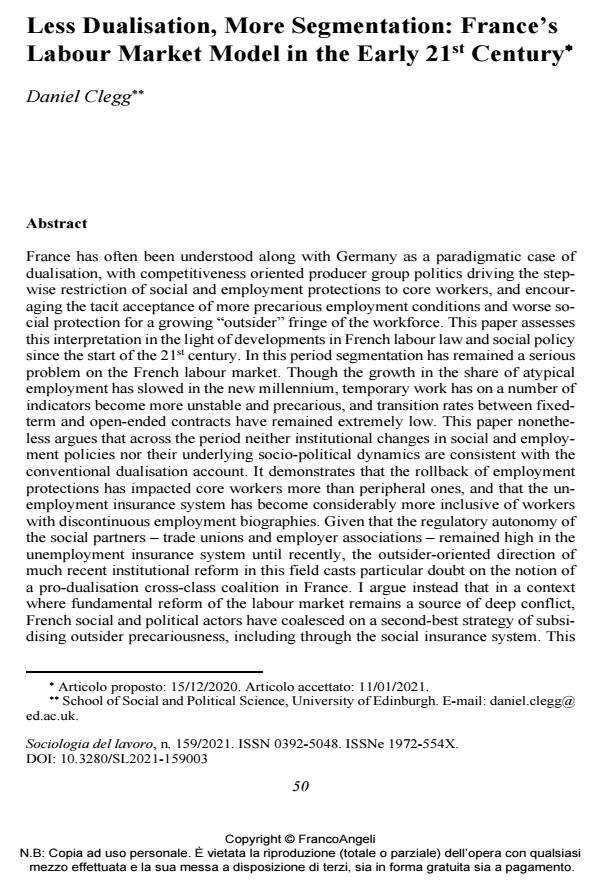Less Dualisation, More Segmentation: France’s Labour Market Model in the Early 21st Century
Titolo Rivista SOCIOLOGIA DEL LAVORO
Autori/Curatori Daniel Clegg
Anno di pubblicazione 2021 Fascicolo 2021/159
Lingua Francese Numero pagine 21 P. 50-70 Dimensione file 244 KB
DOI 10.3280/SL2021-159003
Il DOI è il codice a barre della proprietà intellettuale: per saperne di più
clicca qui
Qui sotto puoi vedere in anteprima la prima pagina di questo articolo.
Se questo articolo ti interessa, lo puoi acquistare (e scaricare in formato pdf) seguendo le facili indicazioni per acquistare il download credit. Acquista Download Credits per scaricare questo Articolo in formato PDF

FrancoAngeli è membro della Publishers International Linking Association, Inc (PILA)associazione indipendente e non profit per facilitare (attraverso i servizi tecnologici implementati da CrossRef.org) l’accesso degli studiosi ai contenuti digitali nelle pubblicazioni professionali e scientifiche
France has often been understood along with Germany as a paradigmatic case of dualisation, with competitiveness oriented producer group politics driving the step-wise restriction of social and employment protections to core workers, and encour-aging the tacit acceptance of more precarious employment conditions and worse social protection for a growing "outsider" fringe of the workforce. This paper as-sesses this interpretation in the light of developments in French labour law and so-cial policy since the start of the 21st century. In this period segmentation has re-mained a serious problem on the French labour market. Though the growth in the share of atypical employment has slowed in the new millennium, temporary work has on a number of indicators become more unstable and precarious, and transi-tion rates between fixed-term and open-ended contracts have remained extremely low. This paper nonetheless argues that across the period neither institutional changes in social and employment policies nor their underlying socio-political dy-namics are consistent with the conventional dualisation account. It demonstrates that the rollback of employment protections has impacted core workers more than peripheral ones, and that the unemployment insurance system has become con-siderably more inclusive of workers with discontinuous employment biographies. Given that the regulatory autonomy of the social partners - trade unions and em-ployer associations - remained high in the unemployment insurance system until recently, the outsider-oriented direction of much recent institutional reform in this field casts particular doubt on the notion of a pro-dualisation cross-class coalition in France. I argue instead that in a context where fundamental reform of the la-bour market remains a source of deep conflict, French social and political actors have coalesced on a second-best strategy of subsidising outsider precariousness, including through the social insurance system. This helps to explain why segmenta-tion remains so entrenched in France, but also why France has not seen the sharp rises in working-age poverty that are associated with dualisation elsewhere.
La Francia è stata spesso intesa, insieme alla Germania, come un caso paradigmatico di dualizzazione, con le scelte degli attori politici orientate alla competitività che guida la restrizione graduale delle protezioni sociali e occupazionali nei confronti degli outsiders. Questo articolo valuta questa interpretazione alla luce degli sviluppi del diritto del lavoro e della politica sociale francese dall’inizio del 21° secolo. In questo periodo la segmentazione è rimasta un grave problema sul mercato del lavoro francese. Anche se la crescita della quota di occupazione atipica è diminuita nel nuovo millennio, il lavoro temporaneo è diventato su una serie di indicatori più instabile e precario, e i tassi di transizione tra contratti a tempo determinato e contratti a tempo indeterminato sono rimasti estremamente bassi. Questo articolo sostiene tuttavia che nel corso del periodo né i cambiamenti istituzionali nelle politiche sociali e occupazionali né le loro dinamiche socio-politiche di fondo sono coerenti con il tradizionale modello della dualizzazione. Esso dimostra che lo smantellamento delle protezioni dell’occupazione ha avuto un impatto maggiore sui lavoratori del nucleo centrale rispetto a quelli periferici, e che il sistema di assicurazione contro la disoccupazione è diventato considerevolmente più inclusivo dei lavoratori con biografie occupazionali discontinue. Dato che l’autonomia normativa delle parti sociali - sindacati e associazioni dei datori di lavoro - è rimasta elevata nel sistema di assicurazione contro la disoccupazione fino a poco tempo fa, la direzione orientata verso l’esterno di molte recenti riforme istituzionali in questo campo mette in particolare dubbio la nozione di una coalizione trasversale di classe a favore della dualizzazione in Francia. Si sostiene invece che in un contesto in cui la riforma fondamentale del mercato del lavoro rimane una fonte di profondo conflitto, gli attori sociali e politici francesi si sono coalizzati su una strategia di secondo piano per sovvenzionare la precarietà degli emarginati, anche attraverso il sistema di assicurazione sociale. Questo aiuta a spiegare perché la segmentazione rimane così radicata in Francia, ma anche perché la Francia non ha visto i forti aumenti della povertà in età lavorativa che sono associati alla dualizzazione altrove.
Parole chiave:Francia, mercato del lavoro, dualizzazione, segmentazione, assicurazione contro la disoccupazione
- The Boundaries of the Jobseeker Category in Europe Daniel Clegg, in Zeitschrift für Sozialreform /2025 pp.115
DOI: 10.1515/zsr-2024-0014 - A more liberal France, a more social Europe? Macron, two-level reformism and the COVID-19 crisis Daniel Clegg, in Comparative European Politics /2022 pp.184
DOI: 10.1057/s41295-022-00279-4 - Unemployment benefit governance, trade unions and outsider protection in conservative welfare states Daniel Clegg, Elke Heins, Philip Rathgeb, in Transfer: European Review of Labour and Research /2022 pp.195
DOI: 10.1177/10242589221094240 - Dualisation and part-time work in France, Germany and the UK: Accounting for within and between country differences in precarious work Jill Rubery, Damian Grimshaw, Philippe Méhaut, Claudia Weinkopf, in European Journal of Industrial Relations /2024 pp.363
DOI: 10.1177/09596801221120468 - Making Work Pay in Mature Welfare States Ewan Robertson, pp.147 (ISBN:978-3-032-11472-3)
Daniel Clegg, Less Dualisation, More Segmentation: France’s Labour Market Model in the Early 21st Century in "SOCIOLOGIA DEL LAVORO " 159/2021, pp 50-70, DOI: 10.3280/SL2021-159003